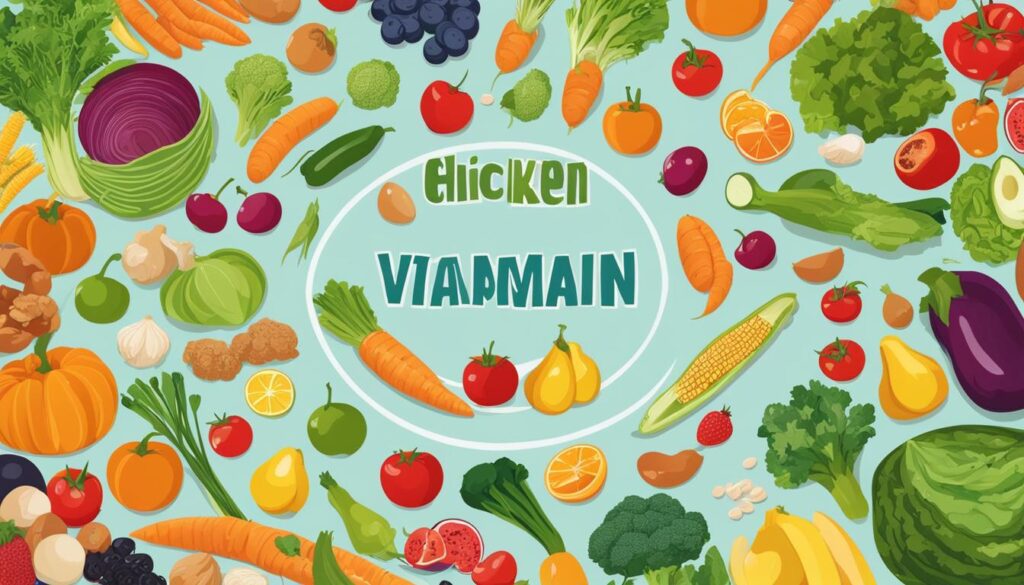Welcome to the world of dog nutrition! As a responsible pet owner, you want to ensure that your furry friend is getting the best possible diet to support their overall health and well-being. Whether you’re feeding them commercial dog food or preparing homemade meals, it’s crucial to provide a balanced diet that includes all the essential nutrients they need.
Proteins, carbohydrates, fats, vitamins, minerals, and water – these are the building blocks of a healthy dog diet. Each nutrient plays a vital role in supporting various bodily functions, from providing energy to supporting the immune system. By finding the right balance, you can help your dog thrive and live their best life.
When choosing commercial dog food, look for labels that state “complete and balanced nutrition” or follow the guidelines set by the American Association of Feed Control Officials (AAFCO). These guidelines ensure that the food meets the necessary nutritional requirements for your dog’s specific life stage.
If you prefer making homemade meals for your pup, it’s important to work with a veterinary nutritionist to create recipes that are “complete and balanced.” They can guide you in choosing the right ingredients and proportions to meet your dog’s individual needs.
Remember to consult with your veterinarian to determine the best diet and feeding schedule for your dog. They will take into consideration factors such as age, size, activity level, and any specific health concerns your dog may have.
Key Takeaways:
- A balanced dog diet includes proteins, carbohydrates, fats, vitamins, minerals, and water.
- Look for dog food labeled as “complete and balanced nutrition” or follow AAFCO guidelines.
- Homemade dog food should be “complete and balanced” and created with the help of a veterinary nutritionist.
- Proteins, fats, and carbohydrates provide energy and support bodily functions.
- Vitamins, minerals, and water are essential for overall health.
The Importance of Proteins in a Balanced Dog Diet
Proteins play a vital role in a balanced dog diet, providing the building blocks for various bodily tissues such as muscles, organs, and enzymes. Dogs require 23 amino acids, and while their bodies can produce 13 of them, the remaining 10 must come from their diet. This makes it essential to include adequate protein sources in your dog’s meals.
Good sources of protein for dogs include meat, fish, poultry, and plant-based proteins such as legumes or tofu for vegetarian diets. These protein-rich foods provide the necessary amino acids to support overall health and well-being. Additionally, growing puppies have higher protein requirements than adult dogs, as proteins are crucial for their growth and development.
| Protein Sources for Dogs | Amino Acids Provided |
|---|---|
| Meat (beef, chicken, turkey) | Essential and non-essential amino acids |
| Fish (salmon, trout, sardines) | Omega-3 fatty acids, essential amino acids |
| Legumes (lentils, chickpeas) | Plant-based proteins, fiber |
By incorporating a variety of protein sources into your dog’s diet, you can ensure they receive a balanced intake of essential nutrients for optimal health and growth.
The Role of Fats in a Balanced Dog Diet
When it comes to a balanced dog diet, fats play a crucial role in providing energy and supporting overall health. Good fats are essential for maintaining healthy skin and coat, as well as for the proper functioning of various bodily systems. Dogs cannot produce sufficient essential fatty acids on their own, which means they need to obtain them from their diet.
There are different sources of fats that can be included in a dog’s diet. Animal fats, such as those found in meat, are a common and beneficial source. Fish oil is another excellent option, as it provides omega-3 fatty acids, which have anti-inflammatory properties and promote overall wellness. Plant-based oils like flaxseed or coconut oil can also be included in a dog’s diet for added health benefits.
The Benefits of Fats:
- Energy source: Fats are a concentrated source of energy, providing more than twice the amount of calories compared to proteins or carbohydrates.
- Healthy skin and coat: Essential fatty acids help keep a dog’s skin moisturized and coat shiny, reducing the risk of dryness, itching, and flakiness.
- Vitamin absorption: Some vitamins, such as vitamins A, D, E, and K, are fat-soluble, meaning they require fats for proper absorption and utilization in the body.
- Inflammation control: Omega-3 fatty acids, found in fish oil, can help reduce inflammation in the body, supporting joint health and overall wellness.
It is important to note that the amount of fat a dog needs in their diet can vary depending on their age, size, activity level, and overall health. Active dogs may require a higher fat intake to meet their energy needs, while overweight dogs may benefit from a diet with slightly lower fat content.

| Fat Source | Main Benefits |
|---|---|
| Animal Fats (Meat) | Provides essential fatty acids, energy, and supports overall health. |
| Fish Oil | Rich in omega-3 fatty acids, helps maintain healthy skin and coat, reduces inflammation, and promotes overall wellness. |
| Plant-based Oils (Flaxseed, Coconut) | Additional source of healthy fats, supports skin and coat health, and provides various health benefits. |
In conclusion, including the right types and amounts of fats in a dog’s diet is essential for maintaining their overall health and well-being. Good fats provide energy, support healthy skin and coat, aid in vitamin absorption, and help control inflammation. Remember to consult with your veterinarian to determine the appropriate fat intake for your dog based on their specific needs and requirements.
The Role of Carbohydrates in a Balanced Dog Diet
Carbohydrates play a crucial role in providing energy and fiber to your dog’s diet. While dogs are primarily carnivores, they have the ability to digest and benefit from carbohydrates. Including high-quality carbohydrates in your dog’s diet can help regulate digestion and provide a source of sustained energy. It is important to choose easily digestible carbohydrates that are rich in nutrients.
The Benefits of Carbohydrates for Dogs
Carbohydrates are an important fuel source for dogs, providing them with the energy they need to support their daily activities. They are also a source of dietary fiber, which aids in digestion and helps maintain a healthy gastrointestinal tract. Fiber can promote regular bowel movements, prevent constipation, and support overall digestive health.
In addition to energy and fiber, carbohydrates can also contribute essential vitamins, minerals, and antioxidants to your dog’s diet. Fruits and vegetables, which are sources of carbohydrates, contain beneficial nutrients that can support your dog’s overall health and well-being.
Choosing the Right Carbohydrate Sources
When selecting carbohydrates for your dog, opt for high-quality sources that are easily digestible. Some examples of good carbohydrate sources for dogs include grains like rice or barley, as well as vegetables and fruits. Avoid carbohydrates that are high in refined sugars or have a high glycemic index, as these can lead to spikes in blood sugar levels.
It is also important to consider your dog’s specific dietary needs when choosing carbohydrate sources. Some dogs may have medical conditions or higher activity levels that require adjustments in carbohydrate intake. Consulting with your veterinarian can help ensure that you are providing the right balance of carbohydrates for your dog’s individual needs.
Remember, carbohydrates should be a part of a balanced diet that includes proteins, fats, vitamins, minerals, and water. Each nutrient plays a crucial role in supporting your dog’s health, and consulting with your veterinarian is the best way to ensure that your dog’s diet meets their nutritional requirements.

| Minerals | Sources |
|---|---|
| Calcium | Dairy products, fish, leafy greens |
| Phosphorus | Dairy products, fish, leafy greens |
| Iron | Red meat, dark leafy greens |
| Zinc | Meats, fish, legumes |
It’s important to note that dogs generally do not require vitamin C supplementation, as they can produce it internally. In fact, excessive amounts of vitamin C can be harmful to dogs. It’s best to rely on a balanced diet and consult with your veterinarian to ensure your dog is receiving the right amount of vitamins and minerals for their specific needs. Remember, a well-balanced diet is the foundation for your dog’s overall health and happiness.
Hydration and the Role of Water in a Balanced Dog Diet
Water is an essential component of a balanced dog diet. It is involved in numerous physiological processes and plays a crucial role in maintaining overall health and well-being. In fact, water makes up more than half of an adult dog’s body weight. While canned dog food may contain a significant amount of water, it is not enough to meet a dog’s daily hydration needs. Therefore, it is important to ensure that your furry friend always has access to fresh, clean water throughout the day.
Dehydration in dogs can lead to serious health issues and even be life-threatening. Even a 10% loss of water in a dog’s body can have severe consequences. To prevent dehydration, make sure to provide your dog with plenty of water, especially during hot weather or periods of increased activity. Keep an eye on your dog’s water bowl and refill it regularly to ensure a constant supply of water.
Remember, different factors can affect a dog’s water intake, such as their size, activity level, and the environment they are in. For example, larger dogs or those who engage in vigorous exercise may need more water to stay properly hydrated. Similarly, dogs living in hot and humid climates or those with certain medical conditions may have increased water requirements. It is important to monitor your dog’s water intake and consult with your veterinarian if you have any concerns.
In summary, water is a vital nutrient for dogs and is essential for their overall health and well-being. Make sure to provide your furry friend with access to fresh, clean water at all times. Monitor their water intake and adjust accordingly based on factors such as size, activity level, and environment. By prioritizing hydration, you can help keep your dog healthy and happy.
| Signs of Dehydration in Dogs | Prevention Tips |
|---|---|
|
|
Feeding Guidelines for a Balanced Dog Diet
Feeding your dog a balanced diet is essential for their overall health and well-being. The frequency and quantity of meals can vary depending on factors such as age, size, activity level, and health condition. It is important to establish a feeding routine that meets your dog’s specific needs to ensure they receive the necessary nutrients.
Meal Frequency
Most adult dogs should be fed once or twice a day, while puppies may require more frequent meals to support their growth and development. Large-breed dogs may benefit from multiple small meals throughout the day to prevent overeating and bloating. Consult with your veterinarian to determine the ideal feeding frequency for your dog.
Portion Size
The appropriate portion size for your dog depends on their size, age, and activity level. Feeding guidelines on commercial dog food packaging can serve as a starting point, but it is important to monitor your dog’s weight and adjust the portion size accordingly. Overfeeding can lead to obesity and associated health issues, while underfeeding can result in nutrient deficiencies. Your veterinarian can provide guidance on determining the appropriate portion size for your dog.
Treats and Table Scraps
Treats and table scraps should be given in moderation, as they should not exceed 10% of your dog’s daily calorie intake. Excessive treats or table scraps can contribute to weight gain and nutrient imbalances. Opt for healthy, dog-friendly treats or consider using small portions of your dog’s regular food as rewards. Avoid feeding your dog foods that are toxic to dogs, such as chocolate, onions, grapes, or raisins.
Remember to provide fresh, clean water for your dog at all times. Hydration is crucial for their overall health and well-being. Consult with your veterinarian to create a personalized feeding plan that meets your dog’s specific nutritional needs and supports their optimal health throughout their life.

Conclusion
Providing a balanced diet with essential nutrients is crucial for maintaining your dog’s overall health and well-being. A well-balanced dog diet should include proteins, fats, carbohydrates, vitamins, minerals, and water. These nutrients support various bodily functions and provide the energy and nourishment necessary for your dog to thrive.
Whether you choose commercial dog food or opt for homemade meals, it’s important to ensure that the diet meets your dog’s specific needs. Look for dog food labeled as “complete and balanced nutrition” or that follows the guidelines set by the American Association of Feed Control Officials (AAFCO). Homemade dog food should be specially formulated by nutritionists to ensure it is nutritionally balanced.
Consulting with a veterinarian is key to determining the optimal nutrient ratios for your dog. They can help you create a diet plan that addresses your dog’s specific nutritional requirements. Regular check-ups with your veterinarian will also ensure that your dog’s diet is suitable for their age, size, and activity level.
Remember, a well-balanced dog diet is the foundation for a happy and healthy companion. By providing the right nutrients in the right proportions, you can help your dog live a long and vibrant life.
FAQ
What should a balanced dog diet include?
A balanced dog diet should include proteins, carbohydrates, fats, vitamins, minerals, and water.
How do I know if dog food is nutritionally balanced?
Look for dog food labeled as “complete and balanced nutrition” or one that meets the nutritional requirements established by the AAFCO.
Can both dry and canned dog food provide adequate nutrition?
Yes, both dry and canned dog food can provide adequate nutrition, but dry food may have added dental benefits.
Can I make homemade dog food for my dog?
Yes, you can make homemade dog food, but it should be specially designed to be “complete and balanced” and created by nutritionists.
What are good sources of protein for dogs?
Good sources of protein for dogs include meat, fish, poultry, and plant-based proteins such as legumes or tofu for vegetarian diets.
Why are fats important in a dog’s diet?
Fats are an important source of energy for dogs and help maintain healthy skin and coat. They also provide essential fatty acids, such as omega-6 and omega-3, which are important for overall health.
Can dogs digest carbohydrates?
Yes, dogs can digest and benefit from carbohydrates in their diet. Carbohydrates provide energy and fiber, which helps regulate digestion.
What vitamins and minerals are important for dogs?
Important vitamins for dogs include vitamin A, vitamin D, vitamin E, vitamin K, and B-complex vitamins. Key minerals needed by dogs include calcium and phosphorus.
Should I give my dog vitamin or mineral supplements?
It is generally not recommended to give dogs vitamin or mineral supplements unless advised by a veterinarian.
Why is water important for dogs?
Water is essential for a dog’s overall health and well-being. It makes up more than half of an adult dog’s body weight and is involved in numerous physiological processes.
How often and how much should I feed my dog?
The frequency and quantity of feeding your dog can vary depending on their age, size, activity level, and overall health. Most adult dogs should be fed once or twice a day.





